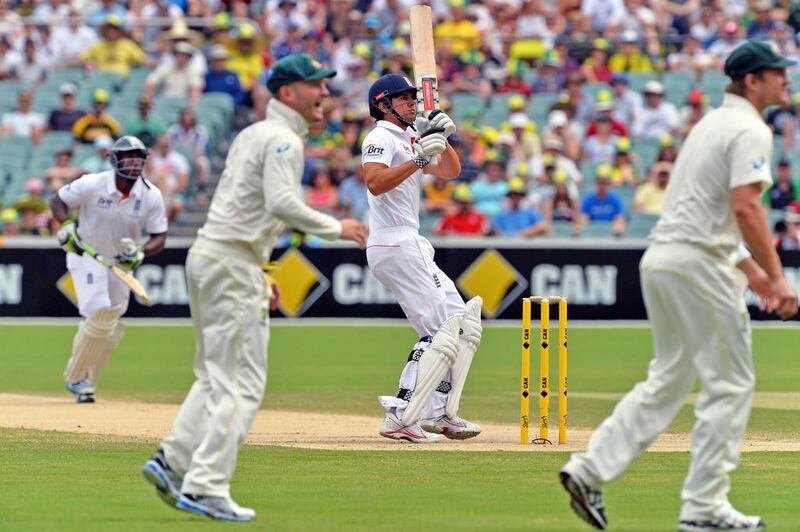Alastair Cook has been here before with England.
In January 2007, he had to stand on the Sydney Cricket Ground with his teammates and watch Ricky Ponting’s Australia celebrate a 5-0 whitewash of the English in the post-match presentations.
If the first two Tests of the current Ashes series are indicative of things to come, Cook will be repeating the experience of being whitewashed next month in Sydney, when the fifth Test takes place, this time as captain.
Six years ago, it happened on Andrew Flintoff’s watch, England’s most humbling experience of recent times. Cook must now devise a way to turn things around for the battered tourists.
The third Test in Brisbane starts on Friday, and it is going to require a Herculean effort for captain Cook and coach Andy Flower to inspire their men to bounce back from the 218-run defeat in Adelaide in the second Test, which was wrapped up quickly in the first session on Monday.
Only one side in Ashes history, the Australian team of 1936/37, lost the first two Tests and came back to win the series, and realistically, Cook’s side is not going to repeat the feat.
How can a side that won the summer Ashes series 3-0 have turned so bad in the space of a few short months?
While England deserved to win on home soil, as they played the key sessions better and the likes of Ian Bell, Graeme Swann and Stuart Broad stepped up when it mattered, proceedings were closer than the final scoreline indicated.
Only in the second Test did England dominate, but even then they sneaked by with a below-par first innings score on a Lord’s track.
Their victories at Trent Bridge and Durham could have easily gone the other way, given they were both close affairs, while rain frustrated the Australians at Old Trafford and the Oval when they were in good positions.
Cricket is a results-driven business. But it appears that victory may have blinded Cook, Flower and the English selectors to the weaknesses that were all too apparent in their game, even if they were still getting proper results.
England’s level has dropped since the summer, while Australia, inspired by a rejuvenated Mitchell Johnson, have raised their game, thus leading to the turnaround.
It is the batting that is at the centre of the problems for England.
The bowling attack, which has so often got them out of trouble, has not been nearly as effective, with Swann badly out of form and James Anderson strangely subdued. This has highlighted the clear weaknesses of England’s batting, which has misfired all year, not just against Australia but also away and at home to New Zealand.
Only once, in 12 Tests, have they scored more than 400 in their first innings, and their first-innings average is only 274.
What was most worrisome about Adelaide was some of the truly abysmal shot selection on show. Set an impossible 530 to win by Michael Clarke, England’s goal in their second innings should have been to make the Australians toil to get the 10 wickets they needed on what was still a good wicket – Australia effectively scored 702 for 12 in their two innings to put England’s pathetic first-innings effort of 172 into context.
Yet Cook led by example by pulling the ninth ball of the innings, a short ball by Johnson, straight to Ryan Harris, leaving a disbelieving home side jubilant.
England were accused by pundits, particularly former Australian cricketer Shane Warne, of being too negative in the summer, but suddenly, when the time truly came to batten down the hatches and to grind out a draw, it was all guns blazing as Cook, Michael Carberry, Matt Prior and Broad all got themselves out hooking.
If this was a plan to tell Australia and Johnson they were not afraid of the short ball, then it did not work.
The only message it gave was that the team lacked the spirit, intelligence and guts to at least make Australia work for their wickets.
As painful as it might be for England fans to read, the Ashes are gone. Worst-case scenario, either early next week in Perth or in Melbourne at the end of the month, the destination of the urn will be confirmed.
At this point, for England, it is about improving. Australia have been comfortably better with bat, ball and in the field, and if that continues in Perth, then a potential whitewash is going to become more of a reality.
gcaygill@thenational.ae





